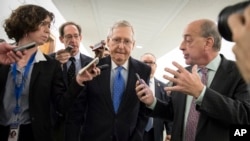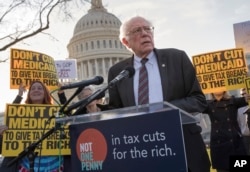Senate Republicans delayed a final vote on an overhaul of the U.S. tax code late Thursday amid furious, behind-the-scenes efforts to fine-tune the legislation to satisfy a small group of fiscal hawks whose support is needed to pass one of President Donald Trump’s core campaign promises.
"Senators will continue to debate the bill tonight," Majority Leader Mitch McConnell, a Kentucky Republican, said, adding that further votes pertaining to the tax bill would occur later Friday.
Only hours earlier, Republicans appeared poised to pass a massive restructuring of federal taxes and deal a stinging defeat to Democrats. Several wavering Republicans had signaled support for the bill, including John McCain of Arizona.
Late in the day, however, three Republicans, led by Senator Bob Corker of Tennessee, clung to a demand that proposed tax cuts would be pared back if future U.S. economic performance did not meet projections.
Republicans have a two-seat Senate majority. Three defections from their ranks would torpedo the bill, given unified Democratic opposition.
With time needed to rewrite portions of the bill to satisfy the Corker contingent, Republican leaders opted to postpone further votes.
Details of plan
The underlying proposal would permanently cut corporate taxes, temporarily cut taxes on wages and salaries, boost some tax deductions Americans can claim while eliminating others, and increase the U.S. national debt, which currently is more than $20 trillion.
The nonpartisan Joint Committee on Taxation issued a report Thursday estimating the Republican plan would sap federal coffers by more than $1 trillion over a decade, even taking into account more than $400 billion in new revenue generated by a projected increase in economic activity.
"The [JCT] score ends the fantasy about magical growth, about unicorns and growth fairies showing that tax cuts pay for themselves," Democratic Senator Ron Wyden of Oregon said.
Republicans insisted a vibrant economy was necessary for fiscal health, and that tax cuts would promote growth.
"If this legislation is signed into law, we are going to have a smaller deficit in future years than we are on the path to have now," Senator Pat Toomey of Pennsylvania said. "The right incentives lead to stronger growth."
Democrats shot back that the federal deficit and income inequality both expanded after every tax cut enacted in recent decades.
"Trickle-down economics did not work under Ronald Reagan, did not work under George W. Bush," independent Senator Bernie Sanders of Vermont, who caucuses with Democrats, said. "It is a fraudulent theory."
"All we are doing is shifting the tax to our kids," Maine Senator Angus King, another independent who also caucuses with Democrats, said. "If 5-year-olds knew what we were doing and could vote, none of us would have a job."
Corporate tax rate
The tax plan would cut corporate taxes from a maximum rate of 35 percent to 20 percent.
"Other countries have learned how to use their tax codes to entice U.S. businesses overseas, businesses around the globe, to their country — to move away from the United States to their countries’ more competitive tax code," Republican Senator Cory Gardner of Colorado said. "That disparity between the U.S. tax code and foreign tax rates has literally chased jobs and wages out of this country."
Some Democrats agreed that U.S. corporate taxes should be lowered, but insisted the Republican plan goes too far and would eventually trigger painful cuts to federal programs that benefit the poor and elderly in the future.
Massachusetts Senator Ed Markey accused Republicans of mounting a "con game" in which they tout tax breaks but gloss over "their brutal, vicious cuts to programs for the poorest, the sickest, the elderly, neediest in our country."
In a sign that Republicans were confident of passing the bill, House Speaker Paul Ryan laid the groundwork for creating a bicameral committee to reconcile differences between the Senate’s legislation and a House version that was approved several weeks ago.
A unified tax plan would have to pass both chambers before it could go to the White House for Trump’s signature.







